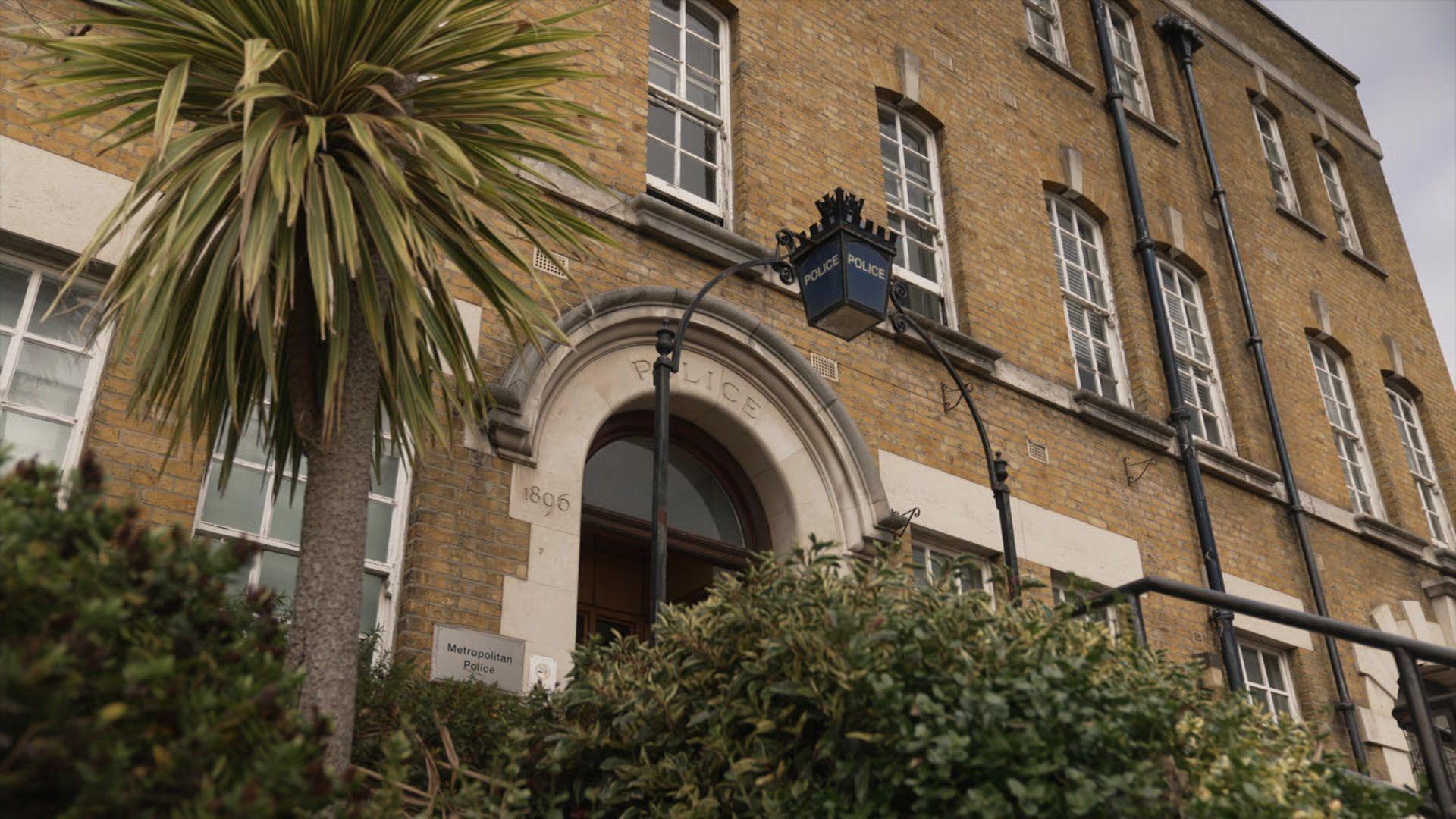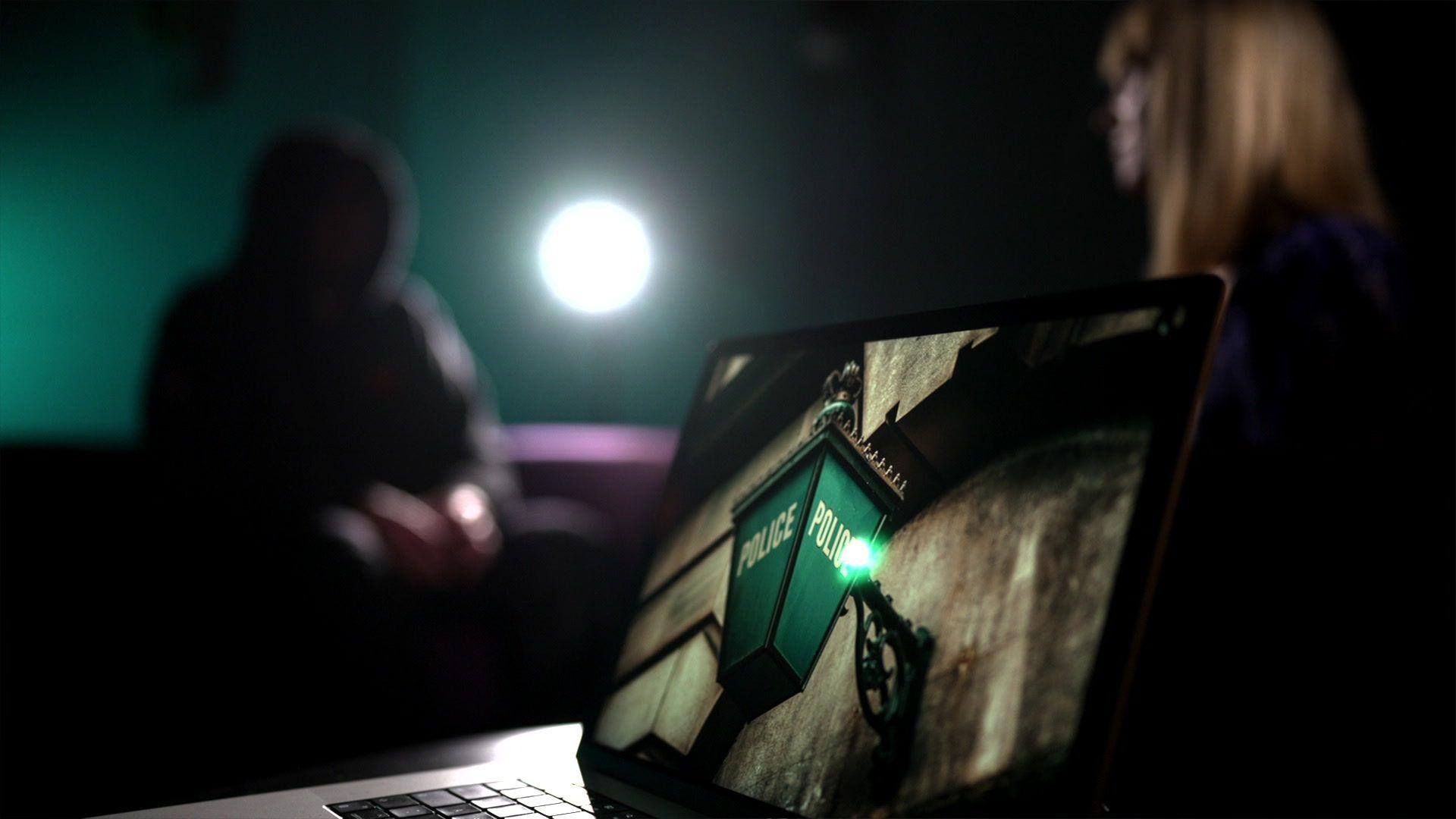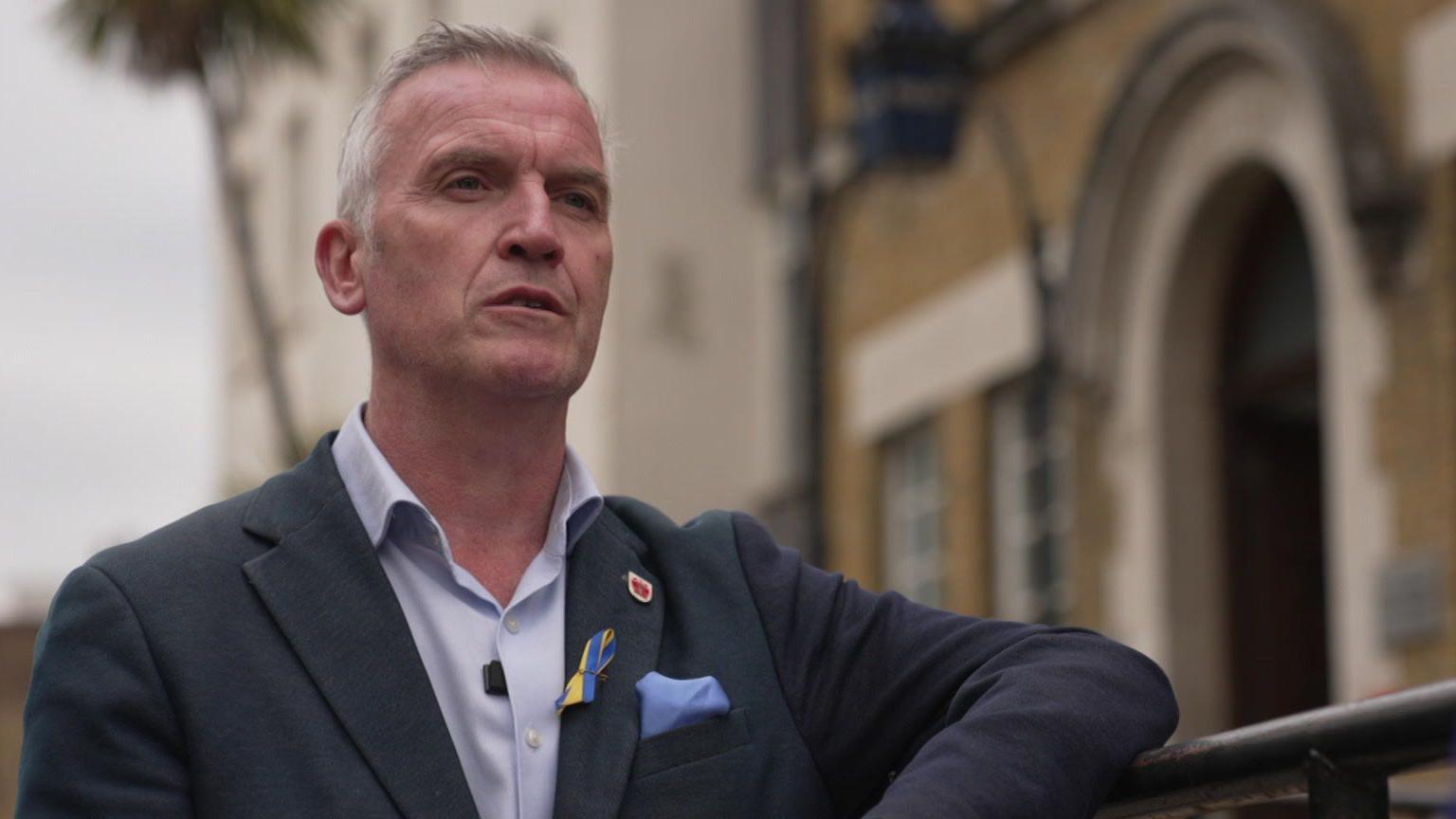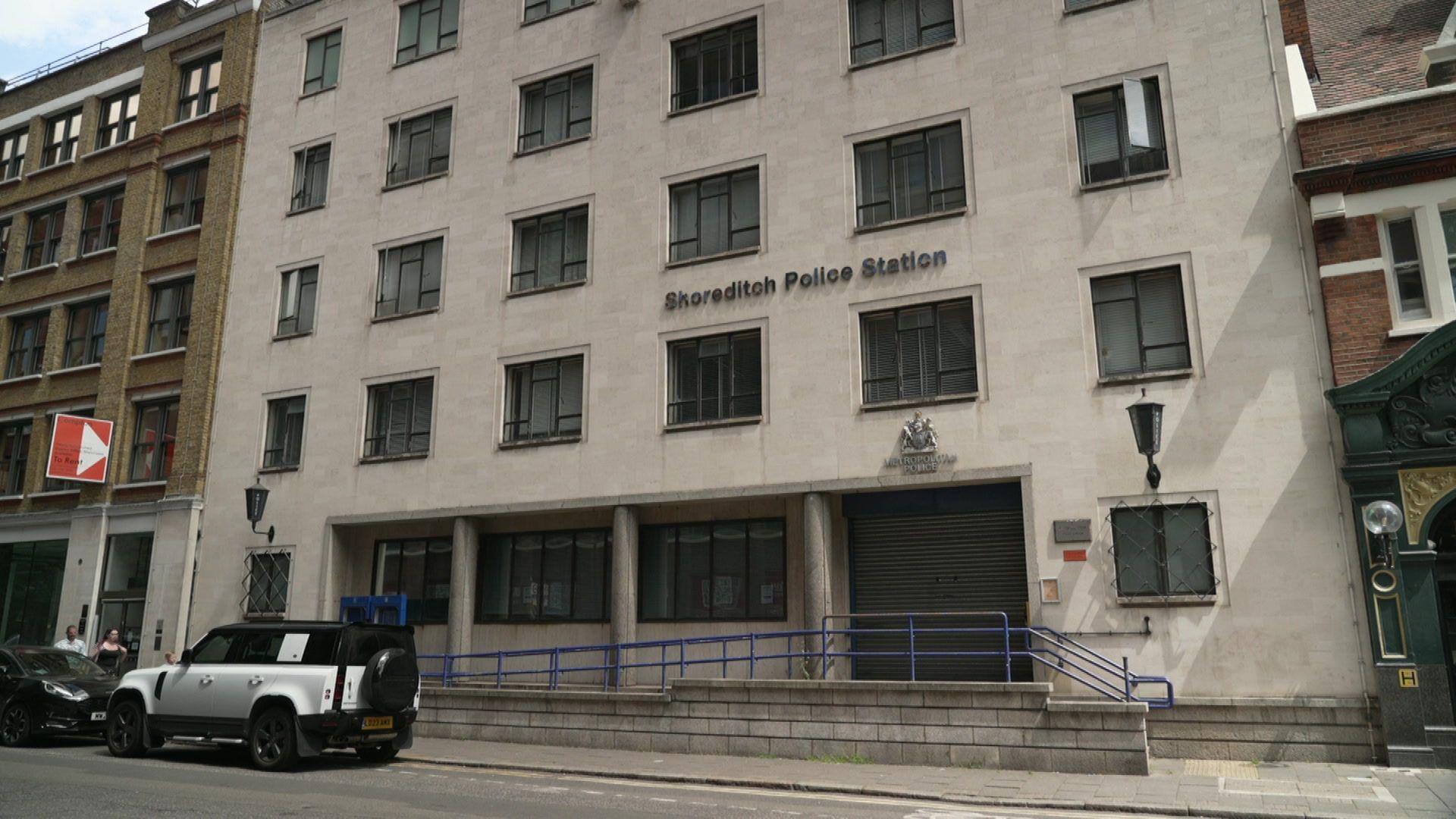London's 24/7 Met Police front counters drop to two

Kentish Town police station's front counter was facing closure but will open with reduced hours instead
- Published
London will be left with just two Metropolitan Police stations with front counters operating 24 hours a day, as ten more are set to close under cost-cutting measures - breaking a pledge made by the force and the mayor of London.
The number of front counters where the public can speak to officers will drop from 37 to 27, and be staffed between10:00 to 22:00 on weekdays and 09:00 to 19:00 on weekends.
Only Lewisham and Charing Cross - where ten officers are currently under investigation by the police watchdog - will remain open 24 hours.
The Met said it would save £7m but some of its staff and victim support groups say it could leave some people at risk if they need face-to-face contact.
The force added it needed to make £260m worth of savings by reducing services and cutting about 1,700 officer and staff roles.
Approximately 5% of crime is reported to front counters, which equates to about 50,000 of the one million crimes reported in London annually, the force said, adding the changes will free up about 2,900 hours of police officer time per month.
Assistant Commissioner Matt Twist said: "The Met is having to shrink to live within its means and, as the public would expect, we are targeting our resources on a narrower set of their priorities to make London safer."
Bishopsgate Police Station, which is run by the City of London Police, has a front counter operating 24 hours a day.
Met officers face fast-track hearings after Panorama investigation
- Published9 October
In full: Met chief's letter to home secretary after BBC investigation
- Published2 October
Watch: Mina Smallman on BBC Panorama's investigation into Met Police
- Published2 October
The Met had initially planned to permanently cut the number of publicly accessible front counters from 37 to 19.
London Mayor Sir Sadiq Khan - who oversees the Met's budget and had made a manifesto pledge to have at least one 24-hour counter open in each of London's 32 boroughs that the Met operates in - said he had "resisted closing front counters unless we really had to do so".
"Whilst this is an operational policing decision, this action would not have been possible without record-breaking funding from City Hall," he added.
In 2013, London had nearly 140 front counters, but the then mayor Boris Johnson closed 65 of them. In 2017 when Sir Sadiq was mayor, a further 38 were closed.
The Met had committed to having at least on front counter open in each borough 24/7 in its A New Met for London, external strategy.
The force added Londoners could continue to be able to book appointments to see an officer and report a crime, access video appointments, phone 999 and 101, report online and contact their local ward officers. Phones will be installed outside closed front counters.

Nick, a police staff member, said the cuts would damage confidence in policing
One member of police staff told BBC London that front counters were "always busy," with officers already called in to fill the gaps.
Nick, who asked us not to use his real name because of concerns about his job security, said "some staff can't even take a break because there's no one to cover them".
He added people come to the station for a variety of reasons: "It could be an update for a crime they reported previously, it could be a tourist that doesn't understand the language.
"It could be just somewhere safe to be if they think someone's following them.
"If you're removing a vital service for the people of London, and you're saying, 'trust us', it's like, 'how can we trust you when you're removing something we all need?'"

Gareth Roberts said the proposals would hit vulnerable Londoners hardest
The plan has been criticised by Gareth Roberts, who sits on the London Assembly Police and Crime Committee for the Liberal Democrats. He said any closures would have "real world consequences for hundreds, if not thousands, of Londoners".
He added it would hit the most vulnerable - "the elderly, people who don't have English as their first language, people who don't have the necessary IT skills to be reporting online" - hardest.
He said while he welcomed the commissioner's commitment to boosting neighbourhood policing, any closure of front counters would impact on the Met's relationship with Londoners.
"When you start losing bricks and mortar, the ability to come in and interact when you want to see a police person, that's going to have a big impact on confidence.
"This just looks like police are retrenching, that they're moving back, they're taking away from the local communities.
"The other thing on everyone's mind is, if it's police front counters today, then is it going to be the actual police stations tomorrow?"
Closing Met Police counters a 'difficult' choice
- Published6 August
Met Police to close half its front desks following budget cuts
- Published17 July
Closing police counters is pragmatic, says mayor
- Published12 September
Domestic abuse charity Refuge also raised concerns.
"We know it takes a lot of courage to contact police, and if someone is walking by a police station and they've built up the courage to go in, I don't think we should be putting up additional barriers, all of which escalate the risk for survivors," said Emma Pickering, its head of tech-facilitated abuse and economic empowerment.
She added many could be left with no alternative options to contact police.
"A lot of survivors report their phones are being monitored, their conversations are being recorded, or being listened to by an abuser," she said.
"Some survivors report that their perpetrators actually work in the police, so they wouldn't necessarily trust a phone call, they would want to be assured they know who they're speaking to before they make any disclosures."
Assembly member and Chingford councillor Emma Best, a Conservative, said the mayor had not measured the impact of closing counters.
"There is huge public concern," she said. "In Chingford alone, our petition against the closure of our front desk got over 1,000 signatures in less than 48 hours."
'Largely underutilised'
In August, Mr Twist told the London Assembly the force was faced with making difficult choices.
"This essentially comes down to us having to choose between keeping officers on London's streets, where they can respond to the public, or retaining the current position on all front counters, which may be a symbolic point of access but are largely underutilised, especially overnight."
On Wednesday, he said: "Londoners tell us they want more visible and responsive policing on the capital's streets and that is exactly what we are going to deliver.
"But we have also listened to their views during an extensive engagement process and, while our funding gap means we must reduce provision, we will keep more front counters open across London."
Panorama: Undercover in the Police
Secret filming by Panorama reveals evidence of racism, misogyny and officers revelling in the use of force at one of London’s busiest police stations, Charing Cross.
Watch now on iPlayer
Mr Roberts said both assembly members and Londoners had been kept in the dark over the plans.
In September, the Deputy Mayor for Policing and Crime, Kaya Comer-Schwartz, admitted that the potential closures had been discussed in November or December last year, although they were not made public until July 2025.
Nick said the lack of clarity on the proposals had caused huge concern among staff and they had been left "in limbo", wondering if they'd still have a job at Christmas.

Shoreditch police station closed to the public in 2017 as part of efforts to save money
Stations set to close are:
Barking Learning Centre, Barking and Dagenham
Chingford, Waltham Forest
Church Street, Westminster
Harrow
Kensington, Kensington and Chelsea
Mitcham, Merton
Pinner (volunteer)
Royalty Studios, Kensington and Chelsea
Twickenham, Richmond
Wimbledon, Merton
Listen to the best of BBC Radio London on Sounds and follow BBC London on Facebook, external, X, external and Instagram, external. Send your story ideas to hello.bbclondon@bbc.co.uk, external